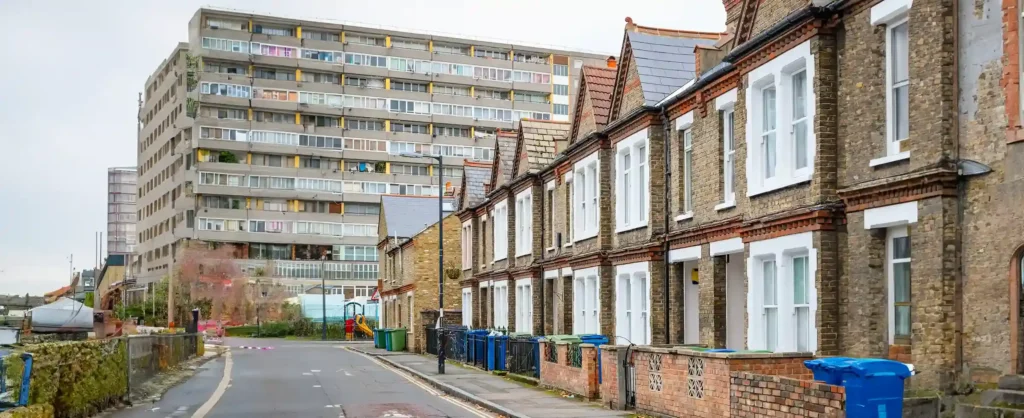Everyone deserves to live in a warm, secure home with a roof over their heads, but for many of the UK’s lowest-income renters, the current state of the social housing market means they have to settle for less.
Fortunately for renters and investors alike, the private sector has recently stepped up to fill long-lived gaps in the housing market and although England has traditionally fallen behind the rest of the UK in terms of affordable social housing investment with 56% of the market in favour of private sector housing, there is increasing evidence that social housing investment could experience a surge of interest.
Interested in investing in social housing but not sure if it’s the right move for you? Here are three reasons social housing could use more private investors and why private investors should keep an eye on social housing.
1. Social Housing Investment is on the Rise
When it comes to property investment, it seems unlikely that social housing would be the first thought in anyone’s mind. And yet, social housing investment has seen an increased level of interest from investors both big and small in the past several years.
Social impact investment company Schroeders BSC Social Impact Trust has estimated that more than £250 billion will be required to adequately respond to the shortage of social and affordable housing in the UK, leaving ample room for investors to fill the market gap left by the UK government. A further survey by Schroders BSC revealed that those investors may be primed to do just that, with £1.1bn of social and affordable housing fund deals being committed in 2022, a marked increase of 35% since 2021.
And the evidence for increased investor interest in social housing does not stop there.
According to real estate company Savills, equity investment in the affordable social housing market has sustained continued growth despite the various challenges to the market posed by rising mortgage rates and fluctuating house prices. As For Profit Registered Providers (FPRP) of social housing continue to acquire more social homes and new providers enter the market, Savills predicts that FPRPs will own 56% of the UK’s social housing stock by 2028.
So where does that leave the average property investor?
International research into social housing markets by the Organisation for Economic Co-operation and Development (OECD) suggests that the future of social housing – and, by extension, social housing investment – will be shaped largely by increased capital spending. This spending is expected to generate both short and long-term benefits for the housing supply and the economic climates of countries that invite it. Increased investment in social and affordable housing will not only allow for a more inclusive economic recovery, but correct recent market trends towards public retrenchment from the housing market, stimulate jobs and address several sustained housing challenges.
Individual and smaller-scale property investors who want to capitalise on the growing interest in social housing investment are increasingly being presented with opportunities to do so by either aligning themselves with social housing investment firms or government initiatives. According to the UK parliament, around 42% of all social homes sold under Right to Buy are currently held by private landlords renting them back to the social housing system. And, with the amount of Environmental, Social and Governance (ESG) funds making up the total of mutual fund investments expected to reach anywhere between 41% and 51% by 2025, those opportunities will only continue to surface to reflect the vital importance of social impact investing to major firms and FPRPs.
2. Social Housing is in Demand
Due to the aforementioned shortage of social housing supply, there is a significant demand for social housing investment that supports the UK’s ability to meet that demand.
The National Housing Federation (NHF) has previously reported that an estimated 8.5 million people in England are unable to access the housing they need. And, with an NHF poll further revealing strong support for affordable social housebuilding from the UK’s main political parties, social housing is a potential growth area largely being held back by supply issues and funding.
These supply issues include the fact that many social homes have been sold back into the private housing market. In the UK, there has been a shift in emphasis away from social homes, with many social rented homes being converted into affordable rent homes and homes sold through Right to Buy legislation often being replaced not with social homes, but with private rented properties. Overall, this has led to a sharp decline in the supply of social housing across the country, with only 11% of new affordable homes being for social rent in 2020-21 despite social rent making up most of the affordable housing supply before 2011-12
According to housing charity Shelter, there are currently over 1 million households on the government waiting list for social housing due to an ongoing shortfall of available rental properties. In England, there are currently 1.4 million fewer households in social housing than there were in 1980 and, given the simultaneous rise in homeless and temporary accommodation households and the fact that housebuilding has halved in the last 50 years, it seems the UK’s social housing market cannot meet demand without a serious influx of support.
Research by University College London has suggested that gradually raising the government subsidy for housebuilding from £1 billion to £5 billion a year over the next five years could lead to an additional 72,000 social homes being built every year, an almost threefold increase on the 28,000 currently being built annually. Doing so would relieve a range of financial and social pressures afflicting the UK as a result of social housing undersupply and could be achievable much more quickly with support from private sector social impact investment.
So, for property investors eager to seize the opportunity offered by increased market demand, social housing investment could be the best way to do so.
3. Social Housing Investment is Good for Everyone
Social housing investment can have a much greater social impact than providing housing for the needy and profit for the conscientious investor: the knock-on effect of an ongoing undersupply of social housing in the UK has created a widespread socioeconomic burden throughout the country.
According to a 2021 post-pandemic housing report by the Local Government Association (LGA), poor-quality homes like those found in temporary accommodation cost the NHS an estimated £2 billion a year. Considering 1 in 10 households on council waiting lists for social housing spend more than 5 years waiting for a property, the magnitude of that NHS impact can only really be lessened by permanent social housing. With the council spending an estimated £1.6 billion on temporary accommodation between 2021 and 2022, an opportunity to scale down spending on temporary housing and reallocate it elsewhere could free up a significant amount of funding for other industries, sectors and initiatives.
Social housing can provide tenants with several advantages that allow them to not only enjoy a greater level of comfort and stability but also recover from poverty and contribute more to the national economy much faster. Government research suggests that the majority of social rent tenants are under 45 and that the share in employment is rapidly growing. When coupled with the fact that a household in social housing typically saves an extra £37 a week compared to a household of private sector renters, it suggests that social housing can allow for a greater scope of saving, wealth accumulation and eventual independence from government support.
Investing in social housing can not only support a better economic climate for renters, the UK government and the NHS, but also support a greener economy due in part to the superior sustainable technology built into new social housing developments. All in all, investors can create lasting social impact with relative ease by seeking out opportunities to invest in social housing.
How Can Concept Capital Group Help?
At Concept Capital Group, we lessen the load for social housing providers by building modular homes that pull renters from a pre-approved list of vulnerable tenants. This means every property we sell to investors like you reduces the number of households stuck in temporary housing while they wait for a new social home to be built.
Our properties are developed using the British Standards Institution’s BS3632 specifications, ensuring that they are suitable for year-round residency that meets contemporary requirements for energy efficiency, heat insulation and comfort. This means tenants are given comfort, security and sustainability at a price point that allows them to support their financial recovery.
For more on how investing in social housing can give your portfolio a leg up, contact our team today.













